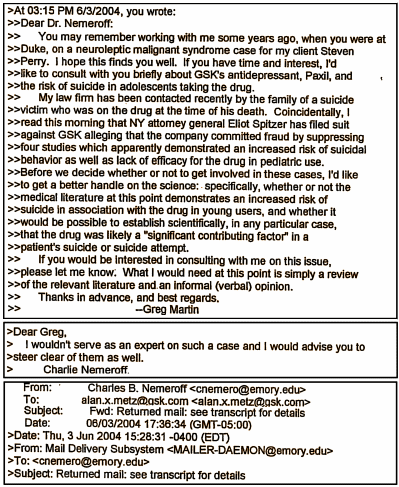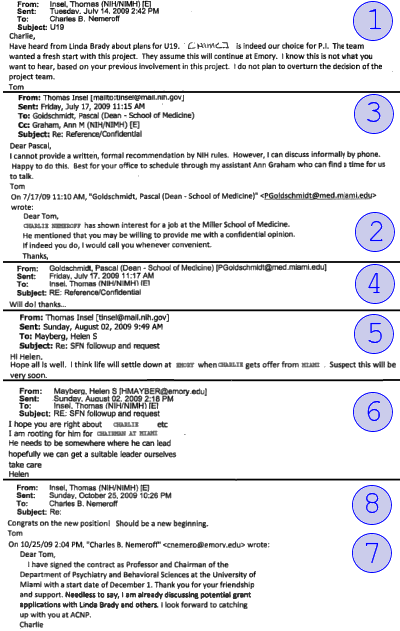… To be specific, in June 2004, an attorney named Greg Martin wrote Nemeroff to ask if he would consult on some planned litigation concerning the likelihood that the Paxil antidepressant might lead some adolescents to attempt or commit suicide. The two had apparently worked together in the past while Nemeroff was a professor at Duke.
And so Martin wrote that he was contacted by the family of a suicide victim who was taking Paxil at the time of his death and the lawyer goes on to note how he read that Glaxo was accused by the former New York attorney general of supressing clinical trial data. “Before we get involved in these cases, I’d like to get a better handle on the science,” Martin writes.
How does Nemeroff respond? “Dear Greg,” he writes, “I wouldn’t serve as an expert on such a case and I would advise you to steer clear of them as well.” A few years later, however, Glaxo was spending hundreds of millions of dollars to settle such cases. But Nemeroff was apparently thinking more about Glaxo.
As the top of the e-mail thread indicates, he promptly forwarded the exchange to Alan Metz, who was the Glaxo vp and medical director for North America at the time. You know, just in case Glaxo execs wanted to keep tabs on what lawyers were thinking about possible litigation. For the drugmaker, consulting payments can come in handy.

As for Nemeroff, he now chairs the psychiatry department at the Miller School of Medicine at The University of Miami, where he is, once again, seeking grants from the NIH, according to sources.

 That last comment about "potential grant applications" along with Insel’s telling Goldschmidt that Charlie could apply for NIMH money and Insel’s allowing Nemeroff to stay on NIMH committees set off a firestorm of protests – and Charlie Nemeroff got real quiet for a while. Insel made a minor mea culpa. But with Charlie, there’s always something waiting to emerge, like the ghostwritten [GSK financed] textbook from back in 1999 exposed by POGO in late 2010 [roaches…]. Now here comes this exchange from 2004 with the lawyer reported by Pharmalot above.
That last comment about "potential grant applications" along with Insel’s telling Goldschmidt that Charlie could apply for NIMH money and Insel’s allowing Nemeroff to stay on NIMH committees set off a firestorm of protests – and Charlie Nemeroff got real quiet for a while. Insel made a minor mea culpa. But with Charlie, there’s always something waiting to emerge, like the ghostwritten [GSK financed] textbook from back in 1999 exposed by POGO in late 2010 [roaches…]. Now here comes this exchange from 2004 with the lawyer reported by Pharmalot above.And there are so many more instances not mentioned here: 1991, testifying that Prozac did not cause suicidal ideas in children; 1993, launching the Paxil Marketing campaign with Sally Laden; interfering with Dr. David Healy’s move to an academic position in Canada because he talked about suicidality with the SSRIs; publishing with henchman Zach Stowe that Paxil was safe in pregnancy; unreported income to Emory in 2004; removal as Editor of Neuropsychopharmacology for unreported conflicts of interest in 2006; the list seems never ending.
This isn’t surprising. If you read the sports pages, you will see that the University of Miami football team may well be facing the death penalty from the NCAA for financial pay offs to players and other malarkey. There is even a photo of Donna Shalala, President of Miami, accepting a check from a disgraced booster who turned out to be a convicted felon. Nemeroff? He is in his own element at Miami!
I read the Pharmalot post earlier today, and I wonder: where does this cross the line into malpractice? It is clear that patient safety and wellbeing doesn’t factor into Nemeroff’s actions in any fashion. At what point should a board of medicine or other regulatory agency be concerned with patient welfare and the general public’s safety? Where are the checks and balances? They don’t seem to lie with NIH, NIMH, the FDA or any regulatory body.
I think this has broader implications in that the social contract between medicine and the public is fast fraying. At what point does it snap and medicine lose its professional status in exchange for that of a licensed technician – highly skilled but without a mission of overarching beneficience, a calling and an independent, self governed code of ethics and practice?
If chronic offender Mr Insel stays at NIH/NIMH, as he has plans to do with big support from his powerful supporters, the chronickest offender Charlie Nemeroff will thrive in getting funded by NIH. It’s a total shame!
I totally agree: the social contract between medicine and the public is fast fraying. And I’m the public (well, one person in the public). Was glad to see it brought up again that Nemeroff “interfered” with the placement of Dr. Healy in Toronto; that’s what brought him on my personal radar screen. Of course, there’ve been many additional blips on that radar screen since. He is truly a gift that keeps on giving.And how ironic that he refused to help with claims that Paxil may contribute to thoughts of suicide BUT HE SERVES ON THE BOARD OF DIRECTORS OF THE AMERICAN ASSOCIATION FOR SUICIDE PREVENTION! (sorry for the caps; I just find this so appalling.)